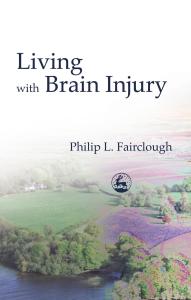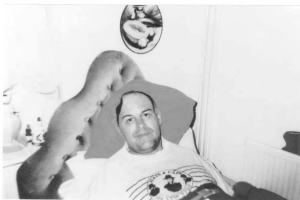Over twenty years ago, Philip Fairclough fell fifteen feet from a ladder onto a concrete patio, causing massive trauma to his head and severe brain injury. Eight years later his book, Living with Brain Injury, was published by JKP. Today, in support of Action for Brain Injury Week, Philip shares with us the progress he has made since writing the book, as well as the lessons he’s learned along the way which are sure to help anyone who has suffered head injury or cares about someone with a head injury.

People often say, ‘Such and such crosses the divide of culture, status, sex, nationality and even religion.’ It wasn’t ’til my book, Living With Brain Injury was published by Jessica Kingsley in 2002 that I realised how brain injury crosses these divides and more – and this was despite my having previously given presentations before groups of litigators dealing with compensation for head injuries, social workers, care givers and hospital staff. It was further brought home to me by the number and types of reviews I read in magazines published here and in the States as well as the letters I have received from carers and sufferers alike.
Things I have learned which have helped me cope in every day life
In the early days, when I saw how my condition was affecting my family, I honestly felt I’d have been better dying. However, since then I’ve come to realise there is always someone far worse off than me and I tell people, now, for me every day is a bonus. Something else I’ve learned, which came as quite a shock, but helped me to try and see beyond the obvious, was understanding why the wives of some of my fellow sufferers, at the rehab unit, left them after their head injury. I remember saying to Pauline, how terrible that they should be abandoned at a most critical time in their life. Her comments on that were quite sobering. She told me that if it wasn’t for the fact that she loved me and took her vows and our faith seriously, she might have done the same! We’ve now been married for forty two years with still some to go!
One final note on the matter of what I have learned. The OT’s at the rehab unit, from day one, stressed the importance of setting realistic goals and, having achieved them, setting some more. Though this was a strategy I had been employing for years, both as one of Jehovah’s Witnesses and as a salesman, it was an invaluable tool in helping me keep focused on the positive aspects of life and putting the negatives on one side.
Things I wish I’d known before my accident
I wish I’d realised just how dangerous window cleaning was and had taken to heart the warning I was being given by the excessive costs of insurance! Yet for all that, whilst I wouldn’t want to relive the past twenty years nor for my family to go through it all again, I have learned so much that I wouldn’t have otherwise, contributing to ways in which I have changed since before the accident. For example; though it seems that my memories of what I was really like before the accident are flawed, one thing I do remember is that I had very little empathy for people with illnesses. Though my wife had suffered with health problems for many years and I was very understanding of her, since I’d had few serious health issues since childhood, I had no understanding of how sick people felt or were treated or what they needed from others. However, that changed fairly quickly when I realised how understanding and helpful people were to me. And not just friends, family, work mates and neighbors, but even total strangers. Since, I suppose, I expected them to understand me and make allowances for me, I was forced to change my attitude towards those with health issues, regardless of how serious or trivial they appeared to be.

Changes in my health
Whereas stamina was a real problem in the beginning, my fatigue requiring me to sleep most afternoons, for the past few years I have not needed to sleep. In fact, I am awake most mornings between five and six and I often work in the garden for two or three hours without ill effect.
Since I have had no seizures for the past fifteen years, meaning that under medical supervision I have been able to cease using anticonvulsants, apart from the freedom I have gained, many of the side effects common to such medication have also ceased or been minimised. This, I feel, has made me easier to live with. You’d have to check with my wife but I think she’d agree! This has also meant I have been driving again for several years and am just in the process of becoming the policy holder for the car insurance, something I’ve not done for over twenty years. I am also no longer classed as disabled which has helped me gain back much of my self worth. I have been working part time for the past fifteen years, back in my old job of selling which is another plus. The one other thing that has changed is that my enforced retirement has allowed me more time to write. Not only have I written my book, I have also written, and had published, sixteen newspaper and magazine articles in the UK and in Malta. I have written five novels, two of which are, at present, doing the rounds with agents, a full length children’s story and I’m currently writing two spin offs from one of my novels. I am determined to get something, in fiction, published! For two reasons: 1) I want to know if people find my fiction worth reading as my non fiction and 2) Despite only having eighteen months to go before officially retiring, I would like to regain self worth from being able to once again earn money to provide for my family. Watch this space!!
Things which haven’t changed!
I still have problems, at times, grasping things which Pauline or others tell me, requiring them to explain them again, sometimes more than once. I still have problems with time telling and numeracy and I also misread situations or misperceive what I think are people’s responses to me. All these things cause me irritation, mostly at myself when I fail to understand things, which I have difficulty hiding.
Final thoughts
I wouldn’t want anyone to get the idea that things are a push over, that head injury is something and nothing or that I’m back to normal! I know I was very fortunate compared with many. I was very fortunate in the speed at which I was dealt with and the expertise available to me that day. I am fortunate in having a family like I do and the kind of friends which we have. Much of what I have is based on determination and a positive attitude and this stems from my unswerving faith in God whom I’m convinced had a hand in my life that day since there were too many coincidences for them to be coincidences! Something else which has contributed to my recovery is that, as one of Jehovah’s Witnesses, I am active in our door to door ministry and regular bible study, all of which has not only kept me physically strong but mentally too, making my neural pathways knit that much faster!
Whether to a sufferer or a carer, my final note on this matter is as follows and you’ll find it in the last sentence in my book:
Remember: Where there is life there is hope and there is DEFINITELY life after brain injury.
You can find out more about the book, read reviews or order your copy here